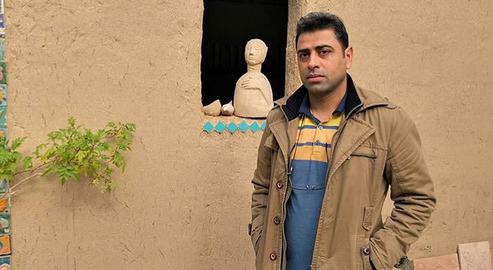One of Canada’s largest trade union confederations has expressed unconditional support and solidarity for Iran’s workers, who continue to face a crackdown from authorities in retaliation for their protests against unfair pay and poor working conditions.
The recent sentencing of seven labor activists to more than 110 years of imprisonment in Iran sent shockwaves around unions across the world, and the Confédération des syndicats nationaux (CSN; Confederation of National Trade Unions), the second-largest trade union federation in Canada’s Québec province, has expressed its solidarity with the factory workers and their supporters. Iranian authorities have also targeted teachers for demanding adequate pay and better working conditions.
CSN has been active for over almost 100 years, and is divided into eight union federations, representing some 300,000 workers in Québec, Canada's French-speaking province. As a union that has played a crucial role in the labor history of the province of Québec, the CSN became secular in 1960, in tandem with the wave of the “Quiet Revolution” that swept through Québec, extricating the province from the hold of the Catholic Church, which had come to hold sway in the socio-political life of the province. When the Québec sovereignty debate was at its apogee during the 1990s, the CSN also adopted an official pro-sovereignty stance, supporting Québec’s independence.
Today, the CSN’s core agenda is focused on the improvement of the quality of life of its members through strengthening political, economic, and social conditions in line with union policies and values.
IranWire spoke to the president of the CSN, Jacques Létourneau, to get a better understanding of this trade union federation, which plays a key role in the lives of a significant number of Quebeckers today, and to reflect on the potential influence it might have on Iranian unions, and unions around the world.
A Long History of Activism
Union activism in Québec has a long tradition. Létourneau has highlighted Québec’s unique linguistic and cultural differences in the North American context, and these characteristics have been reflected in its unions. In fact, if one was to observe a pattern, says Létourneau, it is the fact that unions in Québec have always followed the population, and been a reflection of Québec’s cultural and social traits, both in the past and at present. This pattern is not unique to the CSN, a federation reflecting the diversity of different unions. As secularism gripped Québec through the Quiet Revolution, unions also followed suit. As the sovereignty debate was re-ignited in the 1990s, the unions also largely followed suit and adopted a stance in favor of independence.
CSN is affiliated with the International Trade Union Confederation (ITUC), which formed in 2006 with the merger of the International Confederation of Free Trade Unions (ICFTU) and the World Confederation of Labour (WCL). With its international connections, CSN has been at the forefront of the fight to push for unionization in Québec. Through such unionization, Létourneau, says, “CSN has contributed to the strengthening of the middle class in the province.” In fact, notes Létourneau, had it not been for trade unions like the CSN, the middle class would not be playing such an important role in Québec and in Canada. CSN’s activism has been a key factor in many of the achievements that the middle class in Canada enjoys today. Amongst some of the most significant examples, Létourneau highlighted CSN’s efforts in the establishment and the improvement of a province-wide universal healthcare program, and its push for a more equitable unemployment insurance along with various public services. Létourneau also emphasized CSN’s continuous commitment to pay equity, which has registered an important success recently, although more work needs to be done to attain full equity.
Despite important accomplishments for workers in Québec, trade union federations like CSN have also been facing a range of contemporary challenges in their fight to effect positive change in the lives of workers. As Québec and the rest of Canada have been grappling with labor shortages, driven mainly by the gradual retirement of baby-boomers, Létourneau notes that workers might appear to have the upper hand vis-à-vis their employers at first glance. However, the reality is that workers, especially the younger generation, are not aware of the benefits of unionization and have instead been opting to work on an individual basis to seek other opportunities of employment elsewhere if they are not satisfied with their existing job conditions now that the job market is in their favor. However, such individual actions might prove to be a hindrance to strengthening collective actions promoted by unions. The bottom line is the employer may not feel the need to provide better working conditions if greater individualism takes hold.
Pressuring the State to Honor its Commitments
For democracies to function properly, countervailing powers of civil society against the state’s power is indispensable, and unions are an integral part of civil society. Létourneau notes that the government of Québec is the biggest employer in the province, so transparency when it comes to public finances, as well as the delivery of high-quality services, are some of the government’s key responsibilities. The CSN has pressured the government to improve the working conditions of public sector employees in a variety of ways. Létourneau notes in particular that the CSN is getting ready to meet the provincial government soon to raise the problem of labor shortage in the country in various key sectors such as education and health. The goal, Létourneau says, is to improve the working conditions in these sectors so as to retain more people in order to address the shortage.
A Commitment to Opening the Borders and Empowering Minorities and Women
Trump taking power in the United States and the ensuing fear of numerous unregistered refugees sent scores of refugees toward the Canadian border, Létourneau says. Meanwhile, the situation has also generated fresh debate about borders, and some of Canadian populist politicians, such as François Legault, Québec’s premier, have called for their closure. However, Létourneau believes that closing the border, especially at a time when Québec is in dire need of a workforce, is not the solution; the government should help the needy while at the same time “intelligently integrate” these immigrants, he says. Such integration should take place by providing these immigrants with fair salaries and equitable working conditions while helping them learn the French language.
The CSN also has a long track record of supporting the integration and recruitment of immigrants, women, and LGBTQ communities in general. According to Létourneau, while work still needs to be done, the province has come a long way. He notes that within the CSN, the hiring of minorities and immigrants has gained momentum while the union also intervenes frequently in other workplaces in the province when questions of racism or discrimination are raised by employees.
A Trade Union Federation with an International Commitment
As a member of the International Trade Union Confederation (ITUC), the CSN has direct links with international solidarity movements for unions worldwide. Létourneau says that the CSN has been helping empower small unions in countries including Honduras, Haiti and others in Central America. He notes that it is important for unions in these countries to start exerting countervailing powers through capacity building.
Létourneau also stressed that the CSN follows reports compiled by Amnesty International and the International Labour Organisation (ILO) about countries where workers are repressed for demanding fair working conditions. When asked about the current conditions of many union activists in Iran and the recent sentencing of seven labour activists to more than 110 years of imprisonment, Létourneau stressed CSN’s unconditional support and solidarity for these activists.
visit the accountability section
In this section of Iran Wire, you can contact the officials and launch your campaign for various problems




























comments